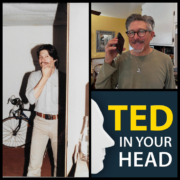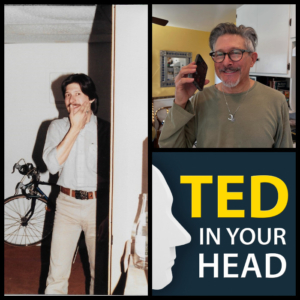A New Direction for the Ted In Your Head Podcast – Episode 472
 In this episode, Ted discusses the desire to take his podcast in a new direction after almost 10 years of the Ted in Your Head Podcast. How to overcome anxiety, how to be more confident, how to let go of worry, these are good topics that Ted have been addressing but now he is asking the question: “How can we live life in a way that allows us to feel excited, inspired, energized and confident in the face of so many changes and challenges? How do we not only avoid falling into negativity and overwhelm, but more importantly, who do we need to be to maintain positivity and keep moving forward?
In this episode, Ted discusses the desire to take his podcast in a new direction after almost 10 years of the Ted in Your Head Podcast. How to overcome anxiety, how to be more confident, how to let go of worry, these are good topics that Ted have been addressing but now he is asking the question: “How can we live life in a way that allows us to feel excited, inspired, energized and confident in the face of so many changes and challenges? How do we not only avoid falling into negativity and overwhelm, but more importantly, who do we need to be to maintain positivity and keep moving forward?
In this episode, Ted is not providing any answers, but instead, is asking the questions that are all on our minds at this moment in time. Please feel free to leave a comment or review.
Listen to this Podcast now:
I want to begin this post by expressing my gratitude to you for reading this or however you are getting my podcast. Whether you’re a regular listener or a first-time listener, or you’re a client, previous or current, if you’re tuning into this podcast in any way, shape or form, I really want to give you, my appreciation. When I started this podcast, I wanted it not only to be a way to get my name and what I do out there, but I really wanted it to be helpful. So, thank you so much for reading this today. I am grateful for you.
The title of this podcast is A New Direction. I’ve been thinking a lot about this podcast and where I want to take it. It’s been about a month since I’ve done a podcast, and I needed some time to think about what I wanted to do with this podcast.
What I’ve been doing, if you if you don’t know already, a lot of episodes on how to how to overcome anxiety, how to deal with test anxiety, how to overcome lack of confidence, how to grow self-esteem, and all of those kind of personal development type things.
I do think that’s been helpful. If you want that information, you can certainly get it from my podcast, and I will continue to do podcast episodes about those topics. But a lot of that information you can get on the internet. Heck, you could type in “How do I overcome test anxiety?” and AI will give you a lot of good information about that.
Now, however, I want to take this podcast in a new direction, because to be honest with you, I was getting a little bit kind of bored with what I’ve been doing, so I took some time off, took a month off to think about what I want to do next.
What I would like to do moving forward is get deeper into the question of who do we need to be to face the challenges of life? But not only that, but who do we need to be to really experience life at a higher level with more excitement, more energy, more juice, if you will. I want to address some of the essential aspects of life, such as, who do we need to be in the face of our own aging, or in the face of seeing our parents age? This is an important topic to me at this point in my life.
Or the loss of loved ones, or the impending loss of loved ones. So instead of coming out of these life challenges and trying to pick ourselves up or put ourselves back together, instead, I want to explore how do we go into these situations and not get so knocked down? In other words, how do we constitute ourselves to be up for these challenges of life? How do we manage to find the time to maintain our own self-care, to maintain our energy, to take care of ourselves? Life is so busy, and if you’re not used to exercising or a higher level of self-care, how do we wrap our head around, what that looks like?
How about money? How do we deal with the money thing in the face of economic uncertainty? A lot of pundits are out there saying we’re headed for a recession or higher prices. I’ve got some kids going into college and that is definitely on my mind. Taking care of vehicles, mortgage, and future security are all things on my mind right now.
How do we avoid worrying or having anxiety about money? This is a very important question, because money is an important situation that we have to deal in our lives today.
However, I just don’t want to talk about challenges. The question I really want to ask is, how can we make life worth living in the face of living in 2025? Whether you’re in the United States or another country listening to this podcast, how do we live life in a way that’s exciting? How do we maintain the wonder, the awe, the excitement of life, rather than allowing ourselves to get ground down by the constant number of things we need to think about, worry about, or be concerned about?
Helen Keller said that life is either an exciting adventure or it’s boring. I don’t think many of us see life as an exciting adventure. If you have a job you have to go to, or you’re not independently wealthy, or you have kids, life can become a real grind. How do we maintain that sense of wonder or awe?
George Bernard Shaw said, “Life is not about finding yourself; it’s about creating yourself.” How do we continue the process of self-creation on a daily basis? What does that even look like?
I think a lot about a guy like David Bowie, the musician, the rock star. I think he’s an example of somebody that was continually looking to recreate himself. Started off as, Ziggy Stardust, then went on to be Thin, White Duke. He continued to present himself in new and exciting ways. And I don’t think you need to be a rock star to be actively involved in the act of self-creation.
But again, what does that look like, and how do we find the time to do that? Does it mean getting a new wardrobe every two or three years? I don’t think so but how do we continue to live life in a way that’s inspiring and creative? If there’s no creativity, if there’s no novelty, that’s when we get burned out, that’s when we lose interest, that’s when we start turning to things to numb ourselves.
I also want to talk to experts. I want to have a lot more conversations, a lot more interviews, asking people, how do you keep from being overwhelmed? I think overwhelm is one of the biggest problems in our life today, too many things to think about, too many things to do, too many things to worry about?
I mean, here I am, I’m a 65-year-old guy in the United States, 2025. I’ve got money to think about. I’ve got a mortgage. We’re a three-car household, and another driver is coming online, insurance, retirement, Medicare, parents. How do you deal with all of that without going crazy, without wanting to immediately come home and pour yourself a drink or take yourself a toke, right? These are the questions that people are coming to me and asking me. Things like “How do I maintain staying out of trance, the spaced out don’t know whether I’m coming or going state? How do I maintain not sinking into despair or worry? Who do I need to be? How do I constitute myself to be a person that is awake, aware and intentionally living life?
I think that’s a big question, when overwhelm gets its fangs into us, then we’re fearful, and that, ladies and gentlemen, is truly the biggest problem of our time: Fear. Fear of what’s going to happen, fear of what’s not going to happen, fear of getting old, fear of dying, fear of losing the people that we love, fear of what’s going to happen with the economy.
There’s a lot of fear right now, at this particular point in time, not only because of what’s going on in the government, but also because the pace of change is so incredibly fast. Things are changing so quickly. How do we even keep up? I mean, you know, I’m looking at having to get a new computer. I was talking to a client the other day where we agreed that even getting a new phone, that can be incredibly stressful. What do we do? How do we do it? How do we maintain our stability, our feeling of being grounded and really having the confidence and trust that we’re able and up for taking on life in all its myriads of joys and challenges in 2025?
Most importantly, I want to hear from you. I really want to hear from you. What’s keeping you up at night? What are you struggling with? What do you think you’ve nailed down? What do you think you have dialed in? I really want to hear from you.
One of the things that’s bothering me is that I don’t get much engagement from the listeners of my podcast, so I want to let you know that you can leave comments at SoundCloud at Tedmoreno.com/podcast, or you go to the transcript of this podcast, which is at Tedmoreno.com/blog and leave a comment on this post.
You can always go to my Facebook page or Instagram page to leave comments about how you feel about any particular podcast or what you’d like to hear, I really want to hear more about what you think about the things that I’m talking about.
So there you go. That’s what I’m thinking about these days. I’m thinking a lot about personally, for me, the next 10 years. What do I want the next 10 years to look like, not just in my own business, but how creative do I want to be I life? What do I want to continue to bring to the world? I’m 65 years old. I figure I’ve got another 10 years of creativity and the ability to make my own unique contribution. Retirement is not really a word that I want to talk about or deal with, because I want to continue to reinvent myself and bring more good stuff to the world.
So that’s what I’m thinking about, and I want to share that with you. And of course, if you want to share something with me, I’m totally open to that. You can go to tedmoreno.com/contact, you can send me an email about your thoughts, and of course, you can send me an email if you are interested in a half hour phone consultation where we can talk about working together, doing hypnotherapy, and your particular situation. We’ll answer your questions, and if you’re ready, we can set up an appointment.
Thank you so much again for listening and take good care of yourself, and we’ll talk again very, very soon.
Have a great day.
Ted





 If you have the sneaky feeling that you are holding yourself back from taking the actions that lead to success, then there is a good chance you are engaging in self-sabotage. While some self-sabotage behaviors are easy to see, some are subconscious and therefore, hidden.
If you have the sneaky feeling that you are holding yourself back from taking the actions that lead to success, then there is a good chance you are engaging in self-sabotage. While some self-sabotage behaviors are easy to see, some are subconscious and therefore, hidden. 


 Does it seem like a lot of people around you are freaking out? Anxious about money, the economy, politics and the future? Is it even possible to maintain a peaceful vibe in the midst of all this anxiety? Yes it is possible and in this episode
Does it seem like a lot of people around you are freaking out? Anxious about money, the economy, politics and the future? Is it even possible to maintain a peaceful vibe in the midst of all this anxiety? Yes it is possible and in this episode 


 I wanted to take some time today to talk to those of you who might be feeling anxious, insecure, and overwhelmed after the recent wildfires here in Los Angeles. I know many of you are dealing with loss, uncertainty, or just the emotional aftermath of everything that’s happened. It’s a lot to process. I also want to speak to anyone out there that has gone through anything like this, whether it’s a natural disaster or some other catastrophic experience.
I wanted to take some time today to talk to those of you who might be feeling anxious, insecure, and overwhelmed after the recent wildfires here in Los Angeles. I know many of you are dealing with loss, uncertainty, or just the emotional aftermath of everything that’s happened. It’s a lot to process. I also want to speak to anyone out there that has gone through anything like this, whether it’s a natural disaster or some other catastrophic experience.
 Ted has turned 65 years old and is reminiscing about his life: choices made, opportunities gained and lost, good times and bad times, trying to figure out Medicare…
Ted has turned 65 years old and is reminiscing about his life: choices made, opportunities gained and lost, good times and bad times, trying to figure out Medicare…
 It’s Friday the 10th as I record write and four major fires are burning across Los Angeles County. My family and I are safe, the closest fire to where we live is the Eaton Fire burning in the hills above Altadena, just north of Pasadena. However, the air is thick with smoke and ash.
It’s Friday the 10th as I record write and four major fires are burning across Los Angeles County. My family and I are safe, the closest fire to where we live is the Eaton Fire burning in the hills above Altadena, just north of Pasadena. However, the air is thick with smoke and ash.

